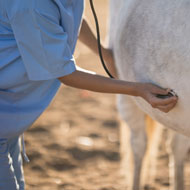
Latest update prompts concerns over equine events
Vets are ‘integral’ to stopping the spread of equine influenza in the UK, the Animal Health Trust (AHT) has said, following a recent update that raises concerns about equine events.
In an email to the Equine Veterinary Group (UK), Dr Richard Newton and Fleur Whitlock said the AHT is continuing to report confirmed cases of equine influenza, with total outbreaks approaching 180 so far this year.
June was said to be a ‘bumper period’ for EI, accounting for just over a third of all cases so far this year in just one month. However, these cases are thought to be an underestimation of the true extent of outbreaks, with many cases going undiagnosed.
The AHT said there has been a week-on-week increase in the number of confirmed cases since the end of April. Increased movement and riding of horses in late spring and summer is said to be a contributing factor, as well as un-vaccinated animals attending events that do not demand EI vaccination as an entry requirement.
AHT put together a series of recommendations for horse owners and event organisers, stressing the importance of the veterinary profession in sharing these messages.
Recommendations include ensuring all horses attending events are vaccinated, ideally confirming vaccination status before arrival. Events are strongly recommended to only accept horses that have had a booster within the past six months, when they are at least five days post-vaccination.
Organisers should confirm there has been no recent history of infectious disease on the competitors’ home yard before they leave for the event.
Owners should also be advised about biosecurity at the competition and when they get back to their home premises. In addition, AHT provided guidance on best practice for introducing new equines to premises.
Vets were also advised to optimise biosecurity between routine calls, as well as carrying appropriate equipment for decontamination and only visiting suspected infectious disease cases at the end of the day as the last call.



 RCVS Knowledge has welcomed Professor Peter Cockcroft as editor-in-chief for Veterinary Evidence.
RCVS Knowledge has welcomed Professor Peter Cockcroft as editor-in-chief for Veterinary Evidence.